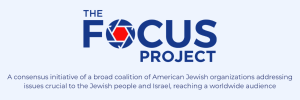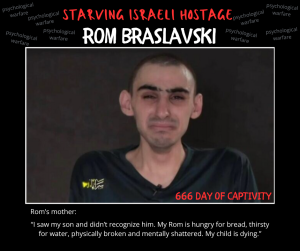
August 5, 2025
STAY INFORMED – TALKING POINTS – ACTIONS TO CONSIDER – STORIES MAKING NEWS
![]()

The war between Israel and Hamas has moved far beyond combat on the ground. A dangerous ideological front is now blazing – affecting global perception, political alliances and public trust. Horrifying images of two emaciated Israeli hostages languishing in Hamas tunnels drew reactions of shock and revulsion while the humanitarian toll on Gaza civilians has drawn global cries of anguish and demands for action.
The Hostages: Few alive, all in crisis
“What I am doing now is digging my own grave,” said Israeli hostage Evyatar David in a trembling voice. He was emaciated and hunched over in a narrow Gaza tunnel with a shovel in hand – in a perverse propaganda video Hamas recorded and recently released. Video clips of another hostage, Rom Braslavski, show the 22-year-old starving and warning he is “on the verge of death.” One clip showed him rolling on the floor clutching his shrunken stomach while painfully begging Israel to send food and water to Gaza.

The appearance of the hostages – emaciated bodies, sunken cheeks – have drawn jarring parallels to Jewish suffering in the Holocaust. This painful comparison spread rapidly across media platforms. It drew public outrage – leading many to condemn Hamas for the deliberate exploitation of hostage suffering – eliciting urgent calls for action to secure their release.

For more than 660 days, the 20 hostages still believed to be alive in Gaza have remained in Hamas captivity – starved, weakened, and deprived of sunlight, with little to no contact beyond their captors. Testimonies from former hostages describe conditions marked by starvation and psychological abuse. All the while, Hamas refuses to allow the Red Cross to evaluate or treat the hostages, administer vital medications or provide even the most basic healthcare. The torture of hostages is intentional.
As calls to release hostages grow louder, international pressure to end the war is intensifying. In a major diplomatic shift, the Arab League, European Union, and 17 other nations have endorsed a proposal calling for Hamas to disarm, relinquish power and release hostages in pursuit of a two-state solution.
The Human Toll and the Propaganda War
The broader international response since Oct. 7 has been shaped by an information and propaganda war where verified reporting is scarce and manipulated imagery abounds. Hamas and the Palestinian Islamic Jihad have historically used civilian suffering as a tool to shift the global narrative – showcasing destruction in Gaza while deflecting any responsibility for embedding fighters and weapons in hospitals, schools, and residential areas. The release of hostage videos was intended to fit into the Hamas strategy, but may have largely backfired as revulsion of their conditions made front page news.
Iran-backed Hamas has proven remarkably effective at controlling the narrative beyond Gaza’s borders. By tightly managing information on the ground, intimidating local journalists, and leveraging international organizations that often rely on Hamas-linked sources—such as the unverified statistics from Hamas’s Gaza Health Ministry—the terrorist regime has created a media ecosystem in which its narrative dominates the global dialogue.
Civilian suffering – both real and manufactured – is broadcast widely, while Hamas’ role in prolonging the war by refusing every ceasefire agreement, stealing and hoarding aid, and continuing to hold hostages is covered up or ignored. In much of the global dialogue, Israel is cast as the sole aggressor, while Hamas, despite its use of human shields and rejection of ceasefires, evades public scrutiny. The result is a lopsided narrative where a murderous terrorist group has successfully positioned itself as both victim and moral authority.
Regarding information being released about Gaza and Hamas’ actions, Matti Friedman told The Free Press in a recent article:
“The consensus was that there were nearly no trustworthy sources regarding reality in Gaza—certainly not the “Gaza Health Ministry,” which answers to Hamas; or Palestinian reporters intimidated by Hamas; or the international organizations, like the UN refugee agency UNRWA, embroiled in various forms of collaboration with Hamas. All of the above are engaged in a successful information campaign that uses Palestinian suffering, real and imagined, to catalyze international anger and tie Israel’s hands.
The international press isn’t the answer. During my years as a reporter and editor for the Associated Press, I saw coverage altered by Hamas’ threats to our staff, while this fact was concealed from readers. I know firsthand that nearly no information coming from Gaza can be taken at face value.”
Regarding reports by the Israeli government on the war progress and its success in pressuring Hamas to release the hostages he cautioned: “But neither can we Israelis trust our own government, which has regularly misled the public about the war’s progress (Netanyahu assured Israelis over a year ago that we were “a step away” from victory); about the shifting goals of the campaign; about the success of various operations, which have seen soldiers repeatedly return to areas that have already been cleared at great cost; and about the priority assigned to the release of hostages, many of whom were released in prisoner swaps only because of American pressure and 50 of whom remain, alive and dead, in Hamas hands …”
The original 1988 Hamas charter – which calls for the destruction of Israel – continues to reflect the group’s actions and rhetoric. The use of propaganda portraying Israel as an inhumane and aggressive colonizer and oppressor is a key part of its strategy to infiltrate minds and shift public views about Israel – seeking to achieve psychologically what it could not achieve militarily.
Feet on the ground: U.S. officials inspect Gaza aid sites
U.S. Ambassador to Israel Mike Huckabee and Special Envoy to the Middle East Steve Witkoff recently made a rare, high-profile visit to Gaza to assess the situation firsthand amid mounting international criticism of the Gaza Humanitarian Foundation (GHF) and concerns about growing hunger in Gaza. In March, Prime Minister Netanyahu announced that he decided to “stop letting goods and supplies into Gaza. We’ve done that because Hamas steals the supplies and prevents the people of Gaza from getting them. It uses these supplies to finance its terror machine, which is aimed directly at Israel and our civilians – and this we cannot accept.”
The two officials said that the core driver of Gaza’s suffering is not Israeli policy but Hamas’s objective – to use starvation to achieve its goals. They cited evidence that GHF, established to replace the chaotic UN-led aid delivery channel, successfully distributed over 100 million meals in two months.
Push for Palestinian statehood divides key allies
France, the UK, Canada and Malta have announced intentions to recognize a Palestinian state – a move framed to preserve the two-state solution but one that diverges sharply from current U.S. and Israeli policy. While these countries emphasize the need to bolster the Palestinian Authority and exclude Hamas from future governance, the U.S. maintains that unilateral recognition of a Palestinian state undermines U.S. and Israeli goals and ceasefire efforts – ultimately rewarding terrorism.
Bipartisan support for Israel shows signs of strain
Support for Israel – once a rare point of bipartisan consensus in Washington – is fraying. Among strong Democratic supporters of Israel like Rep. Ritchie Torres, have warned that Netanyahu’s actions risk lasting damage to the U.S.-Israel relationship, calling it “possibly irreparable.” On the Republican side of the aisle, some have voiced concern over U.S. aid and civilian suffering in Gaza. U.S. Rep. Marjorie Taylor Greene went so far as to label Israel’s conduct in Gaza as genocide. These shifts mirror broader changes in public opinion, particularly among younger voters and independents, where approval of Israel’s conduct has declined since the war began. What was once a cornerstone of U.S. foreign policy is now under debate – with real implications for future aid, diplomacy, and the durability of the U.S.-Israel alliance.
![]()

![]()

![]()

Sarah Awaidah, Palestinian Humanitarian Aid Worker … She fed 100K Gazan families for free – now terrorists want her dead
When much of the world had written off northern Gaza as unreachable, 30-year-old east-Jerusalem resident Sarah Awaidah, a Palestinian, and her team, carved out a lifeline. Under the umbrella of MENA Aid, a regional partner coalition operating through the Multifaith Alliance (MFA), and in coordination with Israeli authorities, she built a system that moved hundreds of trucks of food and supplies into Gaza – bypassing Hamas and private contractors who had turned hunger into a business.
The result: more than 100,000 families fed. The cost: her own safety. “I never imagined that creating a safe, independent humanitarian route would become the reason my life might end,” Sarah Awaidah told Fox News Digital in an exclusive interview that took place in a safe house in Israel.
“After delivering 346 trucks of aid between September 2024 and February 2025, we reached 100,622 families,” Awaidah said. “We decided to scale up distribution on June 30, 2025, at a time when no one was able to get anything into Gaza because of looting, chaos and multiple layers of obstruction on the ground.”
Click here to read the full article
![]()

Stories Impacting American Jews
Stories Impacting the U.S. and Israel
International Antisemitism
In Other News …
Stay Informed | Speak Up | Take Action
Want to Read More of Our Talking Points? Did you miss a recent edition of The Focus Project? No need to search your inbox. Our most recently published editions are available on our website.
![]()

This content is developed by The Focus Project in partnership with MERCAZ USA. The Focus Project distributes weekly news and talking points on timely issues concerning Israel and the Jewish people, including antisemitism, anti-Zionism and the delegitimization of Israel. It represents a consensus view across a spectrum of major American Jewish organizations. MERCAZ USA recognizes and respects the diversity of views on these issues among its readers and the community at large.